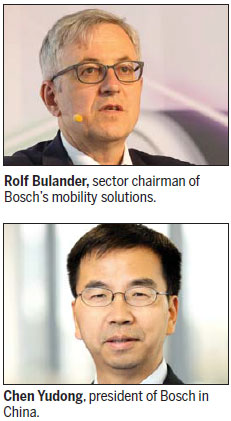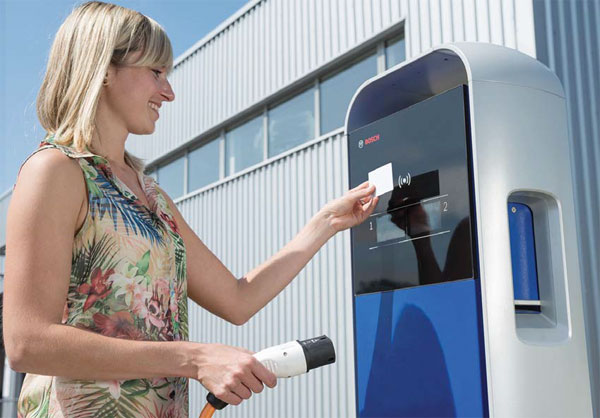Change sparks chance for green future

Attention to environmental protection drives German company's growth in China
Robert Bosch GmbH, the German technology and service supplier, says it will speed up its introduction of electro-mobility, automated and connected driving technologies in China over the next five years.
This opportunity is being taken by the company as China wrestles to reduce carbon emissions from vehicles, to upgrade its industry and to include more environmentally friendly measures as the country grows economically.
| From left: A Bosch engineer in an automated driving car on a test track; illustration shows that Bosch's MySPIN system allows smartphone access from car's touchscreen; the company's augmented reality applied in automotive workshops allows technicians to see, for instance, the location of hidden components on a tablet. Photos provided to China Daily |
| Plug-in vehicles present new business opportunities. Photos provided to China Daily |
Rolf Bulander, sector chairman of Bosch's mobility solutions, the company's biggest sector, says there are two drivers for electrification in China: the regulation of fuel consumption in the market and strong government support for new-energy vehicles.
"Electrification is insufficient to meet these fuel consumption requirements," Bulander says.
"In terms of improving the combustion engine, these requirements need to be met. One of the main tasks of our factories and joint ventures in China is to offer more solutions to further optimize the function of combustion engines."
This year Bosch Automotive Diesel Systems will open a factory in Qingdao, Shandong province, that will produce direct fuel injection systems for heavy and light commercial vehicles as well as for passenger cars. The factory, the second of its kind that the company will have in the country, is in response to growing demand for energy-saving and emissions-reducing products in China's motor vehicle industry.
"On this path to the mobility of the future, Bosch is already achieving success, not just technologically but also commercially," Bulander says. "We are pursuing three development paths toward driving: electric, automated and connected."

In its new form the Chinese economy will be more sustainable, more efficient and involve lower production costs. The government wants to shift the economy from a fast, manufacturing, export driven one to one that is based on services and domestic consumption, and that puts a premium on green innovation and applications.
Bulander says the combustion engine will remain the basis for efficient mobility well into the next decade, especially in China and developed markets even if the powertrain is electrified. Over the next five years, Bosch engine-related technology will be able to reduce the fuel consumption of diesel engines by 10 percent, and that of petrol engines by nearly 20 percent, he says.
Bosch Mahle Turbo Systems opened its first factory in China, in Shanghai, last year. The factory, designed to produce up to 2 million turbochargers a year, will provide the Chinese automotive market with high-quality technology products and comprehensive service support.
Thanks to rising demand led by China and other major markets, the mobility solution sector of Bosch has grown strongly worldwide, with sales rising 13 percent in the first quarter of this year compared with the corresponding period last year.
The company had sales revenue of 52.1 billion yuan ($8.2 billion; 7.2 billion euros) in China last year, 27 percent higher than in the previous year. The company employs a total of 53,000 people in 62 branches in China, Bosch Group's largest workforce outside Germany.
Peter Tyroller, the member of Bosch's board responsible for Asia Pacific, says the Chinese market presents the company with many opportunities.
"In particular, Bosch is grasping the potential presented by automation, electrification, energy efficiency, connectivity, and with the increasing importance of emerging markets."
To build a better service network, last year Bosch set up a franchise car service to meet the increasing demand for alternative energy cars to Chinese car owners in the automotive aftermarket.
By leveraging Bosch's holistic approach - what it calls "parts, bytes, and services" - the franchise network plans to open 1,000 service outlets over the coming three years to provide car owners with standardized, high-quality automotive services.
The company also plans to establish a new mobility-focused service center in Shanghai this year, which will be the first to offer the emergency service eCall in China.
By the end of last year the company had 22 technical centers in the country, with 3,900 local research and development staff.
"Bosch's development in China demonstrates the success of the localization strategy, which the company is in the process of further intensifying," says Chen Yudong, president of Bosch in China. "Localization is the foundation to ensuring further sustainable development in the Chinese market. We are confident we will enjoy healthy growth in the years to come."
To further improve the local value chain and locate more production and engineering close to the company's customers, it has invested a total of nearly 9 billion yuan in China over the past three years. Last year alone it invested 2.7 billion yuan in the country.
Zhao Ying, a researcher at the Institute of Industrial Economics of the Chinese Academy of Social Sciences in Beijing, says that to create better market conditions - local governments need to abolish subsidies on domestic electric vehicles and build more charging and service stations to promote the use of electric cars.
Last year China and Germany signed an agreement under which they would adopt a common standard for charging electric vehicles, hoping to speed up the adoption of new-energy cars in both countries.
Under the agreement, every electric or new-energy vehicle produced in the two countries must be equipped with the same charging plug, and the charging facilities established in the countries will all be based on the same standard.
"Zhao says: "What is also needed is encouraging innovative business models for building and running charging stations, and supporting private capital to enter the electric vehicle leasing, battery rental and recycling sectors."
zhongnan@chinadaily.com.cn
(China Daily European Weekly 10/01/2015 page20)
Today's Top News
- Japan tempting fate if it interferes in the situation of Taiwan Strait
- Stable trade ties benefit China, US
- Experts advocate increasing scope of BRI to include soft power sectors
- New engine powers cargo drone expansion
- China to boost green industry cooperation
- Manufacturing PMI rises in November
































